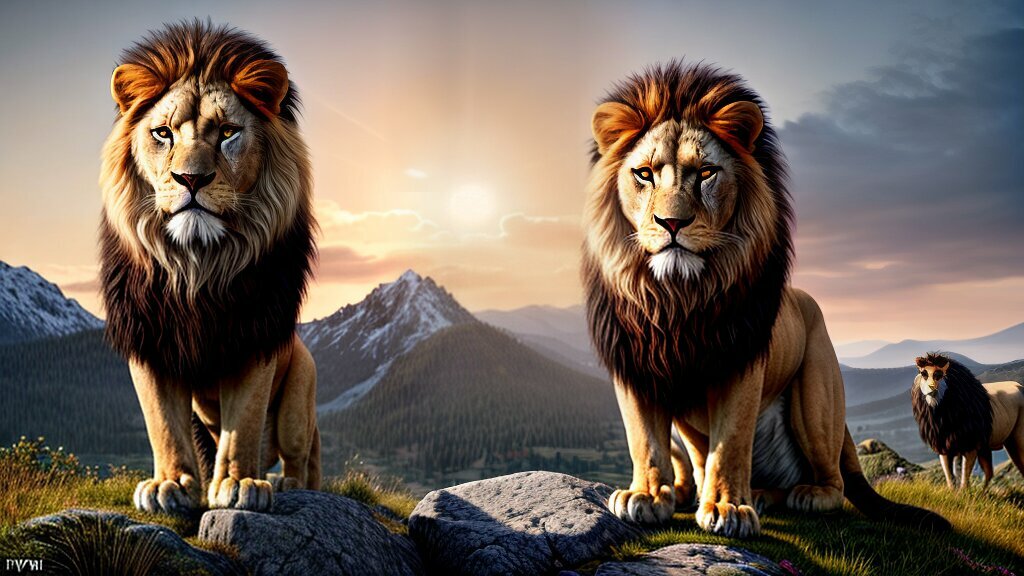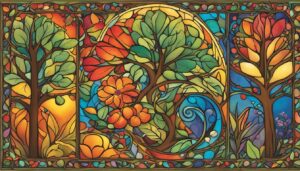Have you ever wondered what the lion symbolizes in the Bible? Lions were highly regarded in biblical times and were used as symbols for a variety of meanings. In this article, we will explore the symbolic meaning of lions in the Bible and their significance in a biblical context.
In the Bible, lions are often associated with strength, courage, and protection. The lion is referred to as the king of the jungle and represents power and authority. Lions are also known for their fierce hunting skills, which symbolize determination and perseverance.
Let’s explore some biblical verses that highlight the symbolic meaning of lions:
- “The righteous are as bold as a lion” – Proverbs 28:1
- “The lion has roared; who will not fear? The Lord God has spoken; who can but prophesy?” – Amos 3:8
- “Be alert and of sober mind. Your enemy the devil prowls around like a roaring lion looking for someone to devour.” – 1 Peter 5:8
These verses depict the lion as a symbol of strength and power, as well as a warning against danger and temptation.
Key Takeaways:
- The lion symbolizes strength, courage, and protection in the Bible.
- Biblical verses depict the lion as the king of the jungle and a symbol of power and authority.
- Lion imagery is often used as a warning against danger and temptation.
Lions in the Old Testament
In the Old Testament, lions were often used as symbols of strength and power. One of the most famous references to lions can be found in the story of Daniel in the lion’s den. In this tale, King Darius is tricked into signing a decree that forbids anyone from praying to any God or man except for the king himself. Despite this decree, Daniel continues to pray to God three times a day.
“They said to King Darius, “Daniel, who is one of the exiles from Judah, pays no attention to you, Your Majesty, or to the decree you put in writing. He still prays three times a day.” When the king heard this, he was greatly distressed; he was determined to rescue Daniel and made every effort until sundown to save him.” – Daniel 6:13-14
The officials catch Daniel praying and he is thrown into a den of lions. However, God protects Daniel and he emerges unharmed the next morning. This story is often cited as an example of God’s protection and the power of faith. Lions are also mentioned in the story of Samson, who is said to have torn apart a lion with his bare hands.
“Some time later, when he went back to marry her, he turned aside to look at the lion’s carcass, and in it he saw a swarm of bees and some honey. He scooped out the honey with his hands and ate as he went along. When he rejoined his parents, he gave them some, and they too ate it. But he did not tell them that he had taken the honey from the lion’s carcass.” – Judges 14:8-9
The strength and fearlessness of a lion was also used to describe King David and the courage of his warriors. In 2 Samuel 17:10, Absalom is warned not to attack David because he and his men are “as fierce as a wild lion.”
Lion Symbolism in the Old Testament
Biblical references to lions often symbolize strength, power, and protection. Lions were considered to be the kings of the jungle and their dominance was used as a metaphor for God’s authority in the world. In Psalm 91:13, it says, “You will tread on the lion and the cobra; you will trample the great lion and the serpent.”
The lion was also used to symbolize a warning or a threat. In Amos 3:8, the prophet warns, “The lion has roared— who will not fear? The Sovereign Lord has spoken— who can but prophesy?”
Furthermore, the lion was seen as a symbol of justice and vengeance. In Isaiah 31:4, it says, “This is what the Lord says to me: ‘As a lion growls, a great lion over its prey— and though a whole band of shepherds is called together against it, it is not frightened by their shouts or disturbed by their clamor— so the Lord Almighty will come down to do battle on Mount Zion and on its heights.’”
Overall, the symbolism of lions in the Old Testament is multifaceted, representing strength, power, protection, warning, justice, and vengeance.
The Lion of Judah
One of the most significant lion symbols in the Bible is the Lion of Judah, which represents strength and power. This symbol is associated with the tribe of Judah, one of the twelve tribes of Israel. In Revelation 5:5, the Lion of Judah is identified as Jesus Christ, who is referred to as the “Lion of the tribe of Judah” and the “Root of David”, emphasizing his divinity and kingship.
The association of the lion with Judah can be traced back to Genesis 49:9-10, where Jacob blesses his sons and prophesies about their future. He describes Judah as a “lion’s cub” and predicts that the “scepter shall not depart from Judah, nor the ruler’s staff from between his feet, until tribute comes to him; and to him shall be the obedience of the peoples” (ESV). This verse highlights the idea that Judah will be a leader among his brothers and will have a lasting legacy of authority.
“Judah is a lion’s cub; from the prey, my son, you have gone up. He stooped down; he crouched as a lion and as a lioness; who dares rouse him? The scepter shall not depart from Judah, nor the ruler’s staff from between his feet, until tribute comes to him; and to him shall be the obedience of the peoples.”
The Lion of Judah is often depicted as a powerful and majestic lion, with a fierce roar that signifies his dominance and authority. This symbol has been used extensively in Christian art and is a popular emblem in many Christian organizations and denominations. The Lion of Judah is a reminder of Christ’s strength and sovereignty, and is an inspiration for us to trust in his power and protection.
The Courageous Lion
When we think of lions in the Bible, we often associate them with courage and bravery. Indeed, the lion is a symbol of strength and power, and we can find numerous references to this majestic animal throughout biblical texts.
In the book of Proverbs, we read: “The wicked flee though no one pursues, but the righteous are as bold as a lion” (Proverbs 28:1). This verse illustrates the idea that those who follow God’s teachings are not afraid to face their enemies, just like a lion is not afraid to confront its prey.
“Be alert and of sober mind. Your enemy the devil prowls around like a roaring lion looking for someone to devour.” – 1 Peter 5:8
In 1 Peter, we are warned of the devil’s deceitful ways, as he is compared to a roaring lion who seeks to destroy God’s children. However, we are also reminded that we can resist him by standing firm in our faith, just like a courageous lion faces its enemy head-on.
Furthermore, the lion’s courage and strength are also associated with leadership. In the book of Judges, Samson kills a lion with his bare hands, demonstrating his physical strength and bravery. Later, he becomes a leader of the Israelites, just as a lion is often seen as the king of the jungle.
The Lion of Judah
One of the most significant references to lions in the Bible is the “Lion of Judah.” This phrase is first mentioned in Genesis 49:9, where Jacob blesses his son Judah and says, “You are a lion’s cub, Judah; you return from the prey, my son. Like a lion he crouches and lies down, like a lioness—who dares to rouse him?”
This verse represents the tribe of Judah as a powerful and fearless lion, with the “Lion of Judah” becoming a title for Jesus Christ himself in the New Testament (Revelation 5:5).
The Courageous Lion: Lessons to Learn
As we reflect on the symbolism of the lion in the Bible, we can learn valuable lessons about courage, strength, and leadership. Just like the lion, we can choose to face our fears head-on, relying on God’s strength and guidance to lead us through difficult times.
Let us remember the words of Psalm 28:7: “The Lord is my strength and my shield; my heart trusts in him, and he helps me. My heart leaps for joy, and with my song I praise him.” With God as our strength and shield, we too can be as bold as a lion.
The Lion’s Roar
When a lion roars, it can be heard from up to five miles away. In the Bible, the lion’s roar is a powerful symbol of authority and power. Just as the roar of a lion commands attention and respect, so too does God’s word command attention and respect from his followers.
“The Lord will roar from Zion and thunder from Jerusalem; the earth and the heavens will tremble. But the Lord will be a refuge for his people, a stronghold for the people of Israel.” – Joel 3:16
Here, we see the image of the Lord roaring from Zion, a sign of his power and authority over all things. The earth and heavens tremble at his roar, yet his people find refuge and safety in his strength.
As we journey through life, we can be assured that God’s roar is always with us, guiding and protecting us through every challenge we face.
The Lion’s Roar and Jesus
In the New Testament, Jesus is often referred to as the Lion of Judah, a symbol of his strength and power as the Son of God. Just as a lion’s roar commands attention and respect, so too does Jesus’ voice command attention and respect from his followers.
“Then one of the elders said to me, ‘Do not weep! See, the Lion of the tribe of Judah, the Root of David, has triumphed. He is able to open the scroll and its seven seals.’ “- Revelation 5:5
Here, we see the Lion of Judah triumphing over all things, able to open the scroll and its seven seals. This image of Jesus as a lion represents his power and authority over all things, and his ability to bring triumph and victory to his people.
As we listen to the roar of the Lion of Judah, we can find strength and courage to face any challenge, knowing that his power is with us always.
The Lion’s Protection
The Bible often depicts lions as protectors, symbolizing their role as guardians. In Psalm 57:1, David calls out to God for protection, saying, “Be merciful to me, O God, be merciful to me, for in you my soul takes refuge; in the shadow of your wings I will take refuge, till the storms of destruction pass by.” Here, the wings of God are likened to a lion’s protective shelter.
In addition, Proverbs 30:30 describes a lion as “mighty among beasts and does not turn back before any.” This verse emphasizes the lion’s strength and ability to protect its territory and those within it. Similarly, in Isaiah 31:4, God is described as a lion who protects Jerusalem: “For thus the Lord said to me, / ‘As a lion or a young lion growls over his prey, / and when a band of shepherds is called out against him / he is not terrified by their shouting / or daunted at their noise, / so the Lord of hosts will come down / to fight on Mount Zion and on its hill.'”
“For thus the Lord said to me,
‘As a lion or a young lion growls over his prey,
and when a band of shepherds is called out against him
he is not terrified by their shouting
or daunted at their noise,
so the Lord of hosts will come down
to fight on Mount Zion and on its hill.'” – Isaiah 31:4
The imagery of a protective lion is also present in the story of Daniel in the lion’s den. In Daniel 6:22, after God saves Daniel from the lions, King Darius says, “May your God, whom you serve continually, deliver you!” Again, the lion is depicted as a fierce and powerful beast, but one that is ultimately under the protection of God.
Through these verses and stories, we learn that lions are not just symbols of strength and power, but also of protection and refuge. Like a lion, we can trust in God’s strength and protection to keep us safe in times of trouble.
The Lion and the Lamb
One of the most profound symbols in the Bible is the representation of the lion and the lamb. In the book of Isaiah, it says “The wolf shall dwell with the lamb, and the leopard shall lie down with the young goat, and the calf and the lion and the fattened calf together; and a little child shall lead them” (Isaiah 11:6 ESV).
This imagery of predators living in peace with their prey is a powerful representation of the peace that comes with the reign of God. The lion is often seen as a symbol of power and the lamb as a symbol of meekness. Together, they represent both the strength and gentleness of the Messiah.
“Behold, the Lion of the tribe of Judah, the Root of David, has conquered, so that he can open the scroll and its seven seals” (Revelation 5:5 ESV).
Here, the Lion of Judah is referenced as conquering and having the ability to open the scroll. This speaks to the power and authority of Jesus as the Messiah and the fulfillment of prophecy.
The Lion’s Hunting Skills
One of the most well-known characteristics of lions is their incredible hunting skills. In fact, multiple references to the lion’s hunting abilities can be found throughout the Bible, including:
“The lion, which is mightiest among beasts and does not turn back before any; (Proverbs 30:30)
Here, we see the lion represented as the mightiest among beasts, with a fearless determination to take down its prey. This symbolizes the strength and perseverance necessary to overcome obstacles in our own lives.
Another verse that highlights the lion’s hunting skills can be found in Genesis:
“Judah is a young lion, my son. You return from the prey, my son! Like a lion he crouches and lies down; like a lioness who would dare to rouse him?” (Genesis 49:9)
Here, the lion is used as a metaphor for Judah’s strength and power. The verse emphasizes the lion’s ability to hunt and protect its territory, further emphasizing the importance of strength and courage.
Overall, the lion’s hunting skills represent perseverance, determination, and the importance of protecting what is ours. By emulating these characteristics in our own lives, we too can become fearless hunters, taking on challenges and triumphing over adversity.
The Lion’s Mane
In the Bible, the lion’s mane is often used as a symbol of majesty and glory. In Proverbs 20:29, it states, “The glory of young men is their strength, but the splendor of old men is their gray hair.”
Similarly, the lion’s mane represents maturity and wisdom. The older a lion becomes, the more prominent and impressive its mane grows. This symbolism can be seen in the book of Job, where God asks Job, “Do you give the horse its strength or clothe its neck with a flowing mane?” (Job 39:19)
“The lion’s mane serves as a reminder that as we age and gain wisdom, we should also strive to maintain our strength and dignity, just as the lion does.”
Furthermore, the lion’s mane is also associated with protection. In Daniel 6:22, after Daniel was thrown into a den of lions and miraculously saved, it reads, “My God sent his angel, and he shut the mouths of the lions. They have not hurt me because I was found innocent in his sight. Nor have I ever done any wrong before you.” This verse highlights the lion’s ability to protect and the significance of divine intervention.
Overall, the lion’s mane represents majesty, wisdom, and protection. It serves as a reminder that as we age and gain wisdom, we should also strive to maintain our strength and dignity, just as the lion does.
Lessons from the Lion
As we’ve explored the symbolic meaning of lions in the Bible, we can draw valuable moral lessons from their representation in scripture.
The lion is often associated with strength and power, and we can learn from their perseverance and determination in navigating the challenges they face. In Proverbs 30:30, it says, “a lion, mightiest among beasts, who retreats before nothing.” We too can find strength in our faith and have the courage and bravery to face any obstacle that comes our way.
“But those who hope in the Lord will renew their strength. They will soar on wings like eagles; they will run and not grow weary, they will walk and not be faint.” – Isaiah 40:31
Moreover, lions in the Bible are also depicted as protectors, guarding those in their care. We can learn from their example and seek to protect and care for those around us, whether that be our families, friends, or community. In Psalm 57:1, it says, “Have mercy on me, my God, have mercy on me, for in you I take refuge. I will take refuge in the shadow of your wings until the disaster has passed.”
Finally, we can draw inspiration from the lion’s hunting skills, which represent perseverance and resilience. In 1 Peter 5:8, it says, “Be alert and of sober mind. Your enemy the devil prowls around like a roaring lion looking for someone to devour.” We must be vigilant in protecting our faith and not allow any obstacles or temptations to lead us astray.
Through the symbolism of the lion in the Bible, we can find valuable moral lessons and guidance in facing the challenges of life. Let us draw strength from their representation and strive to live our lives with courage, protection, and perseverance.
Lion Imagery in Prophecy
In addition to its rich symbolism throughout biblical history, the lion is also used in prophecy to signify important future events.
In the book of Revelation, the lion is used in conjunction with the Lamb to represent Jesus Christ, who is both powerful and peaceful. In chapter 5, verse 5, it says, “And one of the elders said to me, ‘Weep no more; behold, the Lion of the tribe of Judah, the Root of David, has conquered, so that he can open the scroll and its seven seals.'” This shows that the lion’s strength is needed to open the seals and reveal the future events to come.
“Then I saw heaven opened, and behold, a white horse! The one sitting on it is called Faithful and True, and in righteousness he judges and makes war. His eyes are like a flame of fire, and on his head are many diadems, and he has a name written that no one knows but himself. He is clothed in a robe dipped in blood, and the name by which he is called is The Word of God.” Revelation 19:11-13
Furthermore, the lion is used to represent Babylon, a powerful and oppressive empire, in the book of Jeremiah. In chapter 4, verse 7, it says, “A lion has gone up from his thicket, a destroyer of nations has set out; he has gone out from his place to make your land a waste; your cities will be ruins without inhabitant.”
Overall, the lion’s presence in prophecy serves as a reminder of God’s power and sovereignty over all things, including the future.
Conclusion
We have delved into the symbolism of lions in the Bible and explored their spiritual significance. From the Lion of Judah representing strength and power to the courageous lion symbolizing bravery and the lion’s roar representing authority, we have seen how lions are embedded in biblical references.
Furthermore, we have examined how the lion represents protection and guardianship, as well as the profound symbolism of the lion and the lamb, representing both power and peace. We have also learned how the lion’s hunting skills symbolize perseverance and determination and how the lion’s mane represents majesty and glory.
Through the symbolic representation of lions in the Bible, we can derive moral lessons and biblical teachings. We can learn from the lion’s courage, strength, and protection, and apply these teachings to our daily lives.
Finally, we have explored the lion imagery in biblical prophecy and its significance in foretelling future events. As we reflect on the spiritual significance of lion symbolism in the Bible, let us remember the words of Isaiah 31:4-5:
“For thus the Lord said to me,
As a lion roars,
And a young lion over his prey
When a multitude of shepherds is summoned against him,
He will not be afraid of their voice
Nor be disturbed by their noise.
So the Lord of hosts will come down
To fight for Mount Zion and for its hill.
Like birds flying about, so will the Lord of hosts defend Jerusalem.
Defending, He will also deliver it;
Passing over, He will preserve it.”
May we draw strength and courage from the lion symbolism in the Bible and trust in God’s protection and deliverance.
FAQ
Q: What does a lion represent in the Bible?
A: Lions in the Bible symbolize strength, power, courage, protection, authority, and hunting skills.
Q: Where can I find lion symbolism in the Old Testament?
A: Lion symbolism can be found in various passages of the Old Testament, such as in the stories of Samson and Daniel.
Q: What is the Lion of Judah?
A: The Lion of Judah refers to the symbol of the tribe of Judah, representing strength and power, particularly associated with Jesus Christ.
Q: How are lions symbolized in Christianity?
A: Lions are often associated with courage and bravery in Christianity, representing the strength and protection offered by faith.
Q: What is the significance of the lion’s roar in the Bible?
A: The lion’s roar symbolizes authority, power, and dominance in biblical texts, reflecting God’s sovereignty.
Q: How are lions depicted as protectors in the Bible?
A: The Bible portrays lions as protectors in various verses, highlighting their role as guardians and symbols of God’s protection.
Q: What is the symbolism behind the lion and the lamb in religious scriptures?
A: The lion and the lamb represent both power and peace, symbolizing the harmony that will exist in God’s kingdom.
Q: How do the lion’s hunting skills symbolize virtues in the Bible?
A: The lion’s hunting skills symbolize virtues such as perseverance, determination, and steadfastness in biblical references.
Q: What does the lion’s mane symbolize in the Bible?
A: The lion’s mane represents majesty, glory, and might, symbolizing God’s grandeur and power.
Q: What moral lessons and teachings can be derived from lion symbolism in the Bible?
A: Lion symbolism in the Bible teaches lessons of courage, strength, protection, and trust in God’s providence.
Q: Where can I find lion imagery in biblical prophecy?
A: Lion imagery can be found in various biblical prophecies, symbolizing power, conquest, and the coming of divine judgment.




